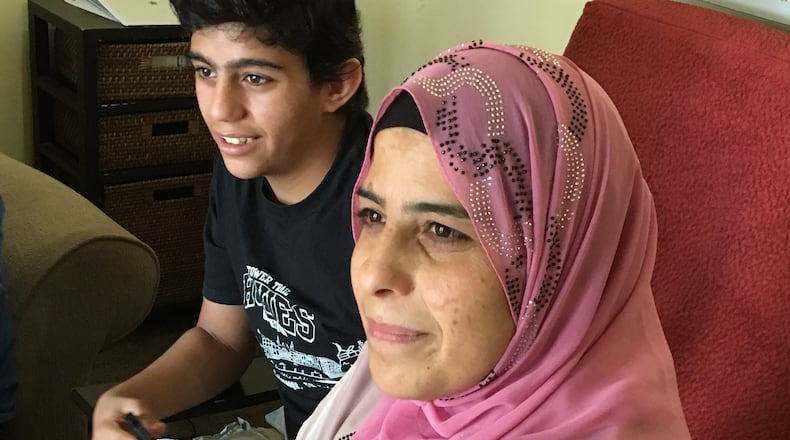Jehad Al Homsi, 43, lives with his wife Manal, their three children and his two brothers in a three-bedroom apartment in Clarkston.
Except for the constant hum of traffic on a busy stretch of Brockett Way, it is a peaceful place and far from the constant bombings they’d grown used to in their native Syria.
Although six years have passed since they fled Dara’a, it’s nearly impossible to forget. Forgetting would mean no longer remembering the family they left behind. For Jehad and Manal not a day goes by that they don’t miss the half dozen or so relatives still there, that they don’t fear for their safety.
The six-year-old Syrian war has been so fierce, it is impossible for those relatives to remain in the same place and stay alive. “They move from place to place to place,” Manal said recently, through an interpreter.
Hundreds of thousands of Syrians have died since the war began. In the city of Aleppo alone, somewhere around 270,000 people have been killed, according to humanitarian organizations and United Nation estimates. But the U.N. stopped counting casualties in August 2015. One monitoring group says the number is closer to 470,000 dead.
If Jehad and Manal had their way, they’d bring their remaining loved ones here post haste. As it is, they don’t know if or when that might be. Especially now.
On Monday, the Supreme Court agreed to allow a limited version of President Trump's ban on travelers from six mostlyMuslim countries, including Syria, to take effect. In October, the justices will consider the president's broad powers in immigration matters in a case that raises fundamental issues of national security and religious discrimination.
That is understandably one of Jehad and Manal’s biggest worries.
Amy Crownover’s, too. She is the spokesperson for New American Pathways, the non-profit that helped resettle Jehad and his family. Crownover called the court’s ruling deeply disappointing.
“During the worst refugee crisis in history, this action hinders organizations like New American Pathways from being able to deliver refugee families seeking safety and stability out of harm’s way,” she said. “At this time, we are awaiting information from the State Department and our national resettlement agencies on how this decision will impact our arrivals.”
Jehad and Manal know how fortunate they are to have made it out of Syria just as the war was starting, joining the nearly 5 million people who have fled the country to date. Another 6.5 million are displaced and trying to find a safe haven.
They escaped just before sunrise one morning, when, despite heavy shelling, they managed to make it on foot 55 miles to Za’tari where the nearest U.N. refugee camp was located. There they could get the papers they needed to travel to Jordan as documented refugees.
It would take four years for the family to complete the vetting process and obtain clearance to fly to the United States.
They arrived here in August 2016 and were resettled by New American Pathways, one of five resettlement organizations in Georgia.
Of the nearly 3,000 refugees who arrive in Georgia annually, the non-profit resettles more than 500 in apartments and helps them find jobs, learn to navigate the city and adjust to their new lives in America.
In fiscal year 2016, 114 Syrian refugees, including small children, settled in Georgia.
When families like Jehad’s first arrive, they are exhausted and weary – shell-shocked. But they are also eager to start anew. More than 90 percent are working and able to pay their own bills within six months of arrival.
Trump’s original travel ban, issued in January, called for a complete and indefinite halt on Syrian arrivals. The second ban in March lifted the indefinite halt for Syrians but still called for a complete shutdown on refugee arrivals for four months. Both executive orders were later deemed unconstitutional by the federal appeals court. On Monday, however, the Supreme Court essentially stopped the hold on the travel ban in certain cases, allowing the administration to ban some people from the U.S.
While the U.S. tries to figure out whether or not to allow more Syrian refugees entry, Jehad's story is a stark reminder that for residents of Syria, this is a life and death issue. Time may not be on their side.
Jehad and Manal are grateful to be here.
For the first time in years, their three children — Abrar, 7, Hamza, 13, and Sulaiman, 17 — can attend school and live in a safe place away from war. Jehad works at Home Goods and supplements his income driving carpool for community members who work in a nearby factory.
It’s a long day. He leaves home about 1 p.m. to start pick up and gets home 12 to 13 hours later, after his shift. Now that the family is self-sufficient, he hopes he’ll be able to find his dream job again — painting cars.
Meanwhile, Manal, is clearly the engine that keeps this family running. She regularly cooks fresh breads and traditional Syrian dishes, makes sure the children stay on task and looks after her husband’s brothers, who have severe mental disabilities.
They say their struggles are not over. The family’s incomes barely match their expenses. They constantly worry about the family they left behind.
But they know life could be a lot worse. Or they could be dead.
“We’re overjoyed to be in America,” Manal said.
About the Author
Keep Reading
The Latest
Featured




